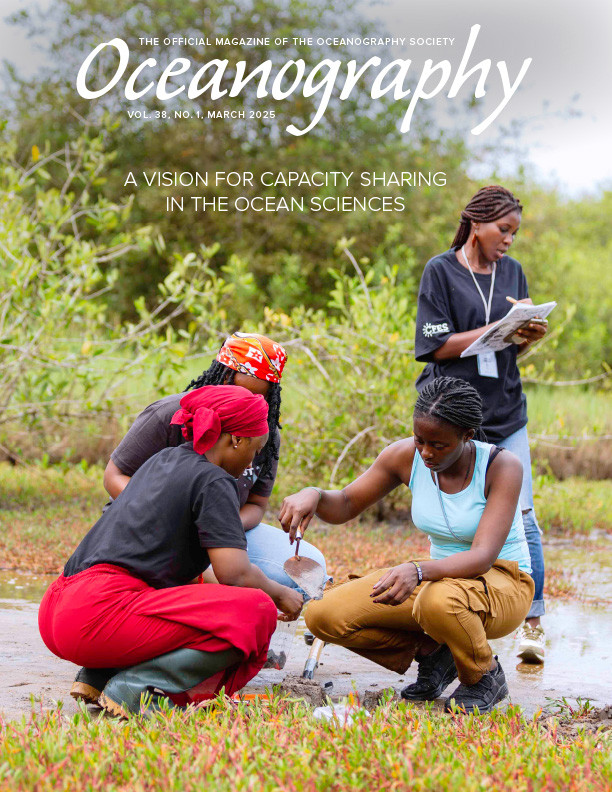Full Text
Introduction
Although not a new phenomenon, interest in artificial intelligence (AI)-based tools has exploded recently. This rapid technological development expands the use of machines beyond prediction and summarization to generating content that closely resembles human work. As a result, applications of AI are expanding rapidly and becoming integrated into various sectors of society (Stevens et al., 2021).
AI is especially relevant in ocean-related sectors due to the complex and challenging nature of research in the marine environment, which requires development of specialized equipment to access. AI tools are uniquely relevant for developing autonomous data collection methods, integrating data from diverse sources, automating processing of large datasets (e.g., from near-real-time sensors) or complex data (e.g., image/pattern recognition), and enabling predictive modeling to forecast ocean and climate phenomena. AI can also be applied to the ocean governance and policy structures that reflect marine system complexity. It can also help to assess risks in maritime activities, provide decision-support tools, enhance ocean monitoring, optimize resource use, and improve the efficiency of processes and operations in the marine environment (Stevens et al., 2021).
Given the increasing prevalence of AI in ocean sectors and the sustainable blue economy, AI literacy is essential for ocean professionals across career stages, job types, and a range of technical competencies. While some ocean professionals engage directly in AI development, use of the increasingly user-friendly tools and applications is expanding into less technical roles involved in the knowledge-to-action pipeline. This increasingly digital landscape in ocean professions and the expanding blue economy, along with the demand for responsible AI, highlights the critical need for all marine professionals to broadly understand AI. This knowledge is essential for effectively using, trusting, interpreting, and sometimes developing AI tools (Stevens et al., 2021; Artificial Intelligence Literacy Act of 2023, H.R.6791).
AI literacy is vital in order to foster curiosity, build confidence, and encourage critical thinking to evaluate the uses and impacts of AI technologies. It can also help ensure that AI tools are implemented in an inclusive and ethical manner and can illuminate responsible, sustainable, novel, and beneficial applications of AI (Wolters et al., 2024). Additionally, AI literacy is a key strategy for mitigating the effects of AI-driven job displacement (Chen et al., 2022).
Existing AI literacy literature focuses on K–12 students and formal education settings (online supplementary Appendix S1). Although interest is growing in expanding AI literacy to professional contexts, higher education, and adult learners, more targeted efforts are needed to effectively engage these groups, including ocean professionals with varying technical skills (Wolters et al., 2024). Practical examples of AI trainings for ocean professionals exist but tend to emphasize methodological and technical competence. Here we propose an AI literacy framework for ocean professionals that includes a holistic definition of AI literacy and briefly explores how to realize the goal of a broadly AI-literate ocean workforce (Figure 1).
|
|
What is AI Literacy?
Building on the framework described in Schüller (2022), we define AI literacy in ocean professions as the values, competencies, and knowledge, across ethical, social, technical, cultural, philosophical, and economic dimensions, needed to navigate in an AI-influenced field. As the efforts to increase holistic AI literacy are in their early stages, there does not yet exist an established consensus curriculum for AI knowledge. However, there is agreement that it can include foundational AI concepts, ethical considerations, real-world examples and practical applications, impact of AI on society, critical thinking and evaluation of AI, and current and emerging AI technologies and techniques (Long and Magerko, 2020; Ng et al., 2021).
How Do We Build, Incentivize, and Enable AI Literacy?
AI literacy requires access to digital tools and motivation to engage with them. Demonstrating the relevance and utility of AI can motivate individuals to explore these tools and concepts. Developing AI literacy among ocean professionals necessitates embedding professional development opportunities within organizational processes and supporting self-directed learning. Educational resources should be accessible, user-friendly, and tailored to specific audiences, and teaching methods should accommodate various learning styles (Dominguez Figaredo and Stoyanovich, 2023). For individuals already in the workforce, professional development, informal learning, and adult education opportunities are needed (Schüller, 2022; Figaredo and Stoyanovich, 2023). For example, the NOAA Center for Artificial Intelligence Learning Journal Library (https://github.com/noaa-ncai/learning-journey/) is a community-generated resource offering open-science tools and educational materials to expand AI knowledge at all levels of understanding.
Achieving AI literacy involves engaging a diverse range of individuals, including students, educators, employees, employers, leaders, funders, and decision-makers from various sectors, including academia, government, nonprofits, and business. Researchers can collaborate with educators to convey AI advancements and ethical considerations effectively. Employers can promote AI literacy by offering resources such as time, funding, and professional development opportunities. Educators and training specialists play a key role in developing and delivering AI education programs. Additionally, decision-makers can advocate for policies that promote AI literacy, potentially through mandates or funding for educational initiatives (Pinski and Benland, 2024).
A Call for AI Literacy in Ocean Professions
Given the widespread and growing presence of AI in ocean sectors, ocean professionals, regardless of technical role, sector, or career stage, can benefit from AI literacy. This literacy encompasses ethical, social, technical, cultural, philosophical, economic, and scientific dimensions. Tailoring AI literacy to specific sectors and professions is crucial to refining frameworks, assessment tools, and educational programs for ocean professionals (Wolters et al., 2024). Future research could focus on a stakeholder-first approach to better understand the contexts in which AI is used in marine careers and to assess existing AI literacy initiatives across various sectors, regions, and backgrounds (Dominguez Figaredo and Stoyanovich, 2023).
While AI can drive rapid, transformative solutions, its potential relies on individuals engaging meaningfully and ethically in its development and use. Thus, AI literacy is vital for ethical and informed participation with AI, which is crucial for a responsible and sustainable future.


